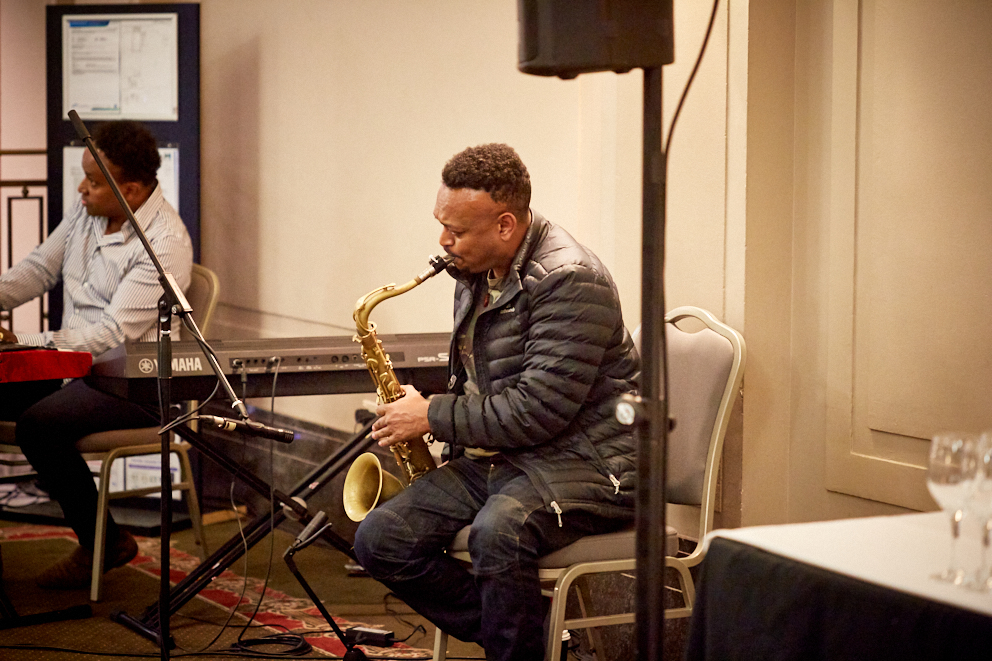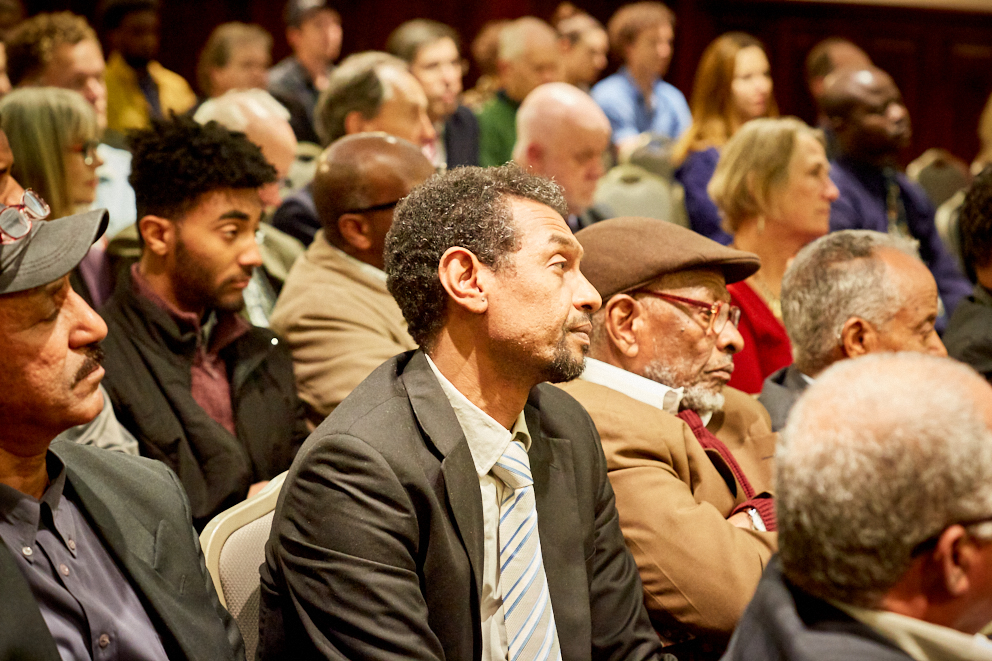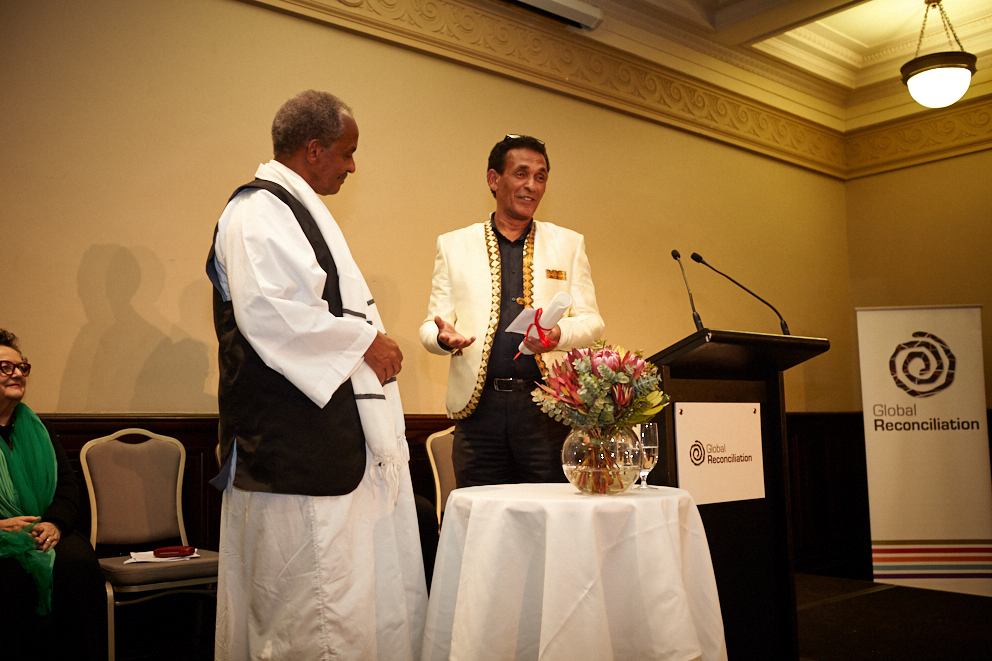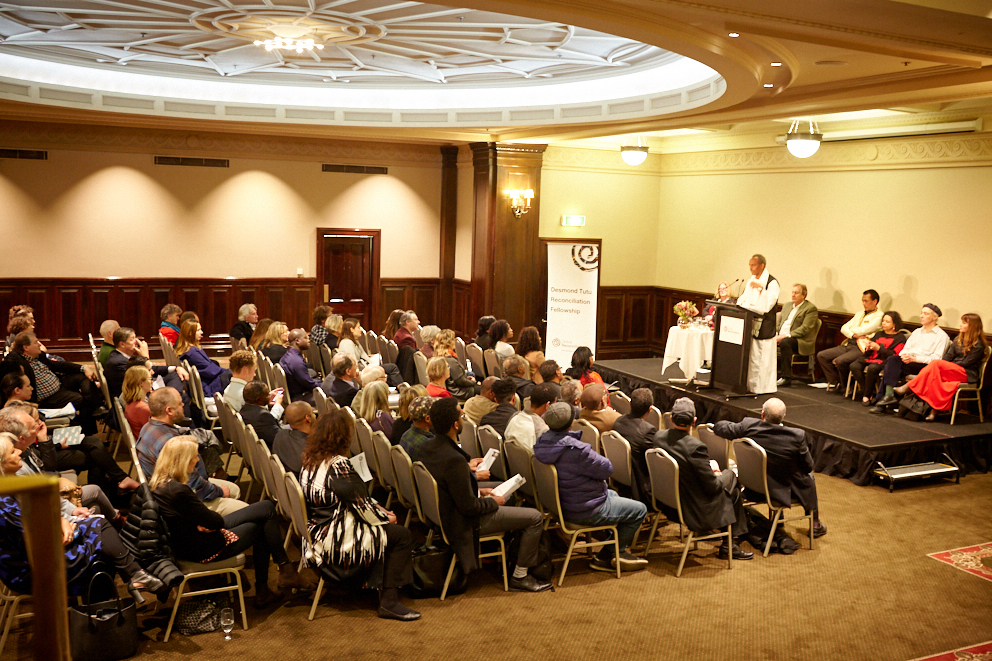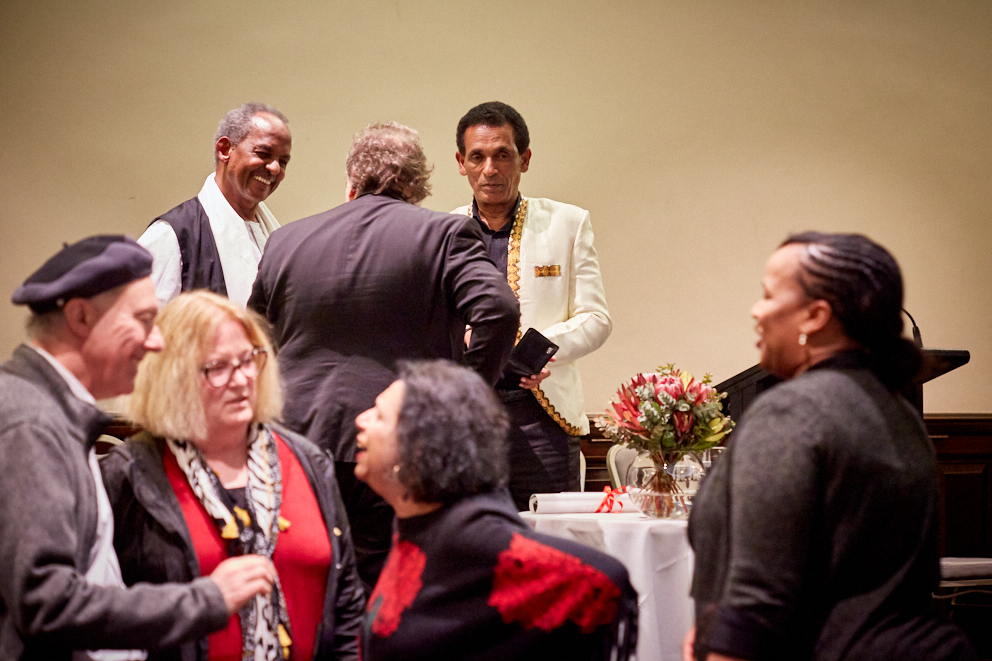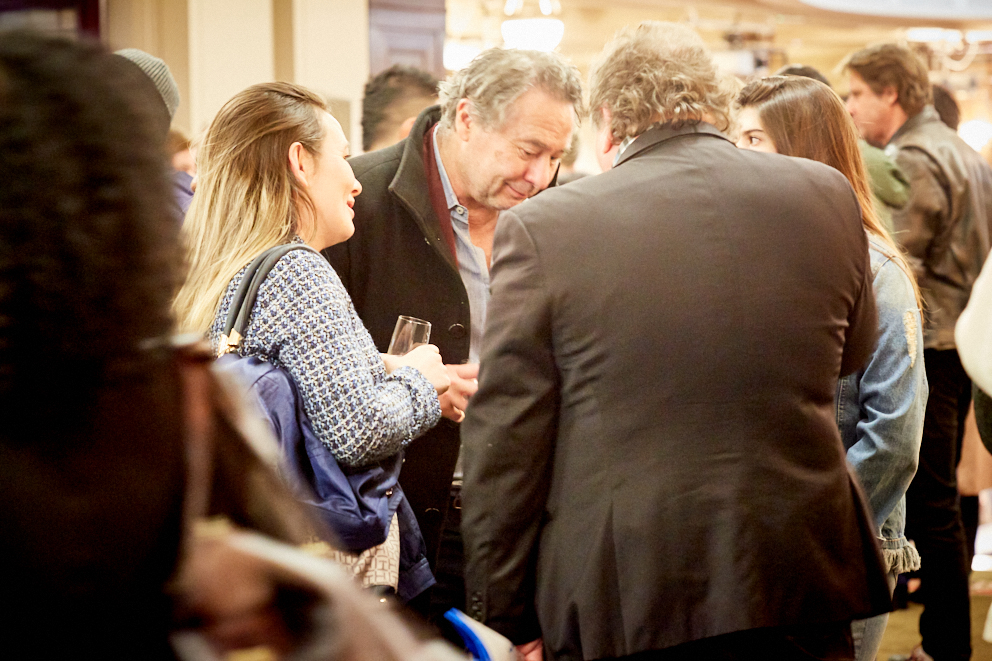Paul Komesaroff: We sought an individual who is courageous and effective, and stands as an inspiration to others
Professor Paul Komesaroff congratulates Dr Zeremariam Fre at Desmond Tutu Reconciliation Fellowship award, Melbourne Town Hall, 4 October 2018.
The 2018 Desmond Tutu Reconciliation Fellowship (DTRF) award was seeking to honour a person who has provided practical leadership in the ethical reworking of our relationship to nature. We were seeking a person(s) who contributed significantly to advancing both the awareness of the need for environmental care and the practices associated with it. Someone who through his or her own work has helped develop innovative responses to contemporary environmental challenges.
Professor Paul Komesaroff, Founder and Executive Director of Global Reconciliation, opened the award ceremony by firstly congratulating Dr Zeremariam Fre for his gracious acceptance of the 2018 DTRF award. Relive the moment and read his speech below:
“Desmond Tutu Reconciliation Fellow Zeremariam Fre, Dr Berhan Ahmed, Ms Dure Dara, Chair of Global Reconciliation, Dr Charles Lane, Chair of the DTRF Committee, ladies and gentlemen.
I would like to welcome you here and to congratulate Dr Zeremariam Fre for his gracious acceptance of the 2018 DTRF award.
The Desmond Tutu Reconciliation Fellowship is administered by Global Reconciliation, an international non-government organisation that works to support dialogues across the boundaries of culture, religion, ethnicity, nationality, politics and other kinds of difference. Our aim is to foster respect and understanding, to support complex and creative partnerships among people who view and experience the world in different ways so that they can use their differences to open the way for novel and creative insights.
The Desmond Tutu Fellowship is the pre-eminent award in the world that recognises contributions to the practice of reconciliation, understood in this manner. It honours individuals who have distinguished themselves by actively addressing key problems of the times, through fostering partnerships, stimulating new ways of looking at old problems, and engaging with communities to precipitate change.
This year’s DTRF theme is environmental care. While the relationship between human beings and the natural environment has always been dynamic, in recent times it has undergone a fundamental, unprecedented transformation. The destruction of natural habitats and other factors have contributed to changes in macro and micro-climate systems. Human societies, for the first time, have acquired the capacity to disrupt or even substantially destroy much of the earth’s living environment.”
“The awareness of the environmental crisis has generated an urgent sense of ethical purpose, to care for, protect and restore the natural environment. This link between knowledge of the intricate and delicate web of nature, with its infinite complexity and unbounded possibilities, and the values that guide our life choices, social relationships and practical actions, has in turn generated a vigorous new practice of reconciliation, based on the need to transform the relationship between human societies and nature, the ways we understand and value both other living things and the natural and physical environments, and to identify actions at the community level that can support and enhance this historical transformation.
For the 2018 Fellowship we sought someone who has provided practical leadership in this ethical reworking of our relationship to nature, a person who has contributed significantly to advancing both the awareness of the need for ecological care, and the practices associated with it, someone who through his or her own work has helped develop innovative responses to the contemporary environmental challenges.
We sought someone who works at the community level in ways that have more than local consequences, a person whose imaginative vision has been able to shift current paradigms and change the way people behave through their actions in a diverse range of settings. We sought an individual who is courageous and effective, and stands as an inspiration to others.
In the person of Zeremariam Fre we have found someone who exemplifies all these qualities to perfection. Having come from a family of small farmers in Western Eritrea, he fled the murderous conflict in his homeland to the United Kingdom in his twenties. There, he retained an awareness of the desperate needs of poor and oppressed nomadic herders in the cluster of countries that make up the Horn of Africa. He became determined to use his personal good fortune in being able to find safety and to obtain an education to honour the integrity of their cultural insights and practices and to support new pathways for them to attain sustainable livelihoods.
In his scientific work he elaborated the unique knowledge of these people, of how to survive in a harsh and sometimes hostile environment, how to work with their animals, with local plants, and with each other, to meet the challenges of the depredations of climate change, war, colonialism, neoliberalism, and religious radicalisation, to survive and flourish.
Through his work Zere has sought not just to support the threatened cultures and knowledge of the pastoral herders in the Horn of Africa but to demonstrate a general principle: the need to respect indigenous knowledge systems and to search them for insights and practices that can be applied to address the challenges of ecological instability around the world. He does not idealise this knowledge. He acknowledges that they are not perfect and must themselves remain open to change. And he has sought to assist this change by helping them draw on modern scientific knowledge and techniques to create sustainable, hybrid practices.
Over the decades, Zere has travelled widely, has conducted his research with rigour and determination, has worked with humility and courage among local communities, and has developed an international network to provide recognition of the strengths, vulnerability and potential of indigenous ways of understanding ecological care.
In the process, he has shown us that the healing of our relationship with nature can occur.
In receiving the Desmond Tutu Reconciliation Fellowship Zere enters a select group of people who have made outstanding contributions to the diverse practices of reconciliation in many countries and in many settings. He joins past winners such as Emmanuel Jal from South Sudan and Canada, Nanko Van Buuren from Brazil, Ian Campbell from the United Kingdom, Katarina Pejovic from Croatia, and June Oscar from Australia.
On behalf of Global Reconciliation and all of you I would like to congratulate Zeremariam on his award and to thank him for his lifetime accomplishments. We hope that the receipt of the Fellowship will not only empower him to continue his work but will also inspire others to emulate his struggles in the fields of peacebuilding, reconciliation and the healing of our relationship with nature.”


